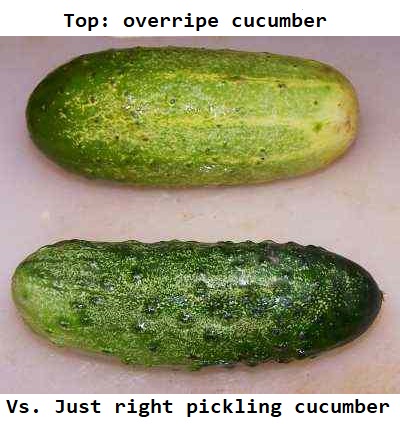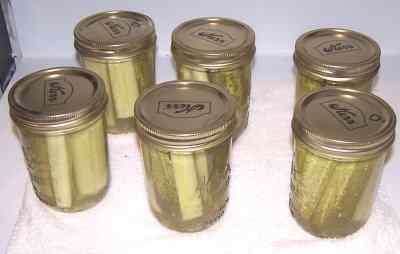
Cucumber U-Pick Orchards in San Antonio area of Texas in 2024, by county
Below are the U-Pick orchards and farms for cucumbers that we know of in this area.
Not all areas of a state have cucumbers farms that are open to the public. If you know of any others, please tell us using the add a farm form!
Remember to always check with the farm's own website or Facebook page before you go - or call or email them if they don't have a website or Facebook page. Conditions at the farms and crops can change literally overnight, so if you want to avoid a wasted trip out there - check with the farm directly before you go! If I cannot reach them, I DON'T GO!
PLEASE report closed farms, broken links and incorrect info using the "Report Corrections" form below.
Atascosa County
- David's Garden Seeds Farm - No pesticides are used, apricots, blackberries, blueberries, Seedless table grapes, lemons, limes, mulberries, melons, nectarines, oranges, pears, peaches, persimmons, plums, pomegranates, asparagus, beans, beets, broad beans, broccoli, you-dig carrots, collard greens, sweet corn, pickling cucumbers, slicing cucumbers, eggplant, kale, lettuce or salad greens, okra, onions, snap peas (edible pod), Swiss chard, summer squash, winter squash, Heirloom tomatoes, paste or Roma tomatoes, tomatoes, watermelons, sunflowers, zinnias, pecans , walnuts, Basil, Mint, Oregano, Rosemary, Sage, Thyme, Honey from hives on the farm, Fresh eggs, concessions or refreshment stand, bakery, picnic area you may bring your own food, restrooms, petting zoo, farm animals, birthday parties, weddings and wedding parties, school tours, group reservations
5029 Fm2504, Poteet, TX 78065. Phone: (210) 502-3797. Email: davidsgardenseeds@outlook.com. Open: Monday 9 to 5 Tuesday 9 to 5 Wednesday 9 to 5 Thursday 9 to 5 Friday 9 to 5 Saturday 10 to 2 longer when fall is here. Directions: Take Highway 35 to Devine. Go South toward Pleaston, on 173 for about 8 miles. Turn left on FM2504 in Kyote. We are on the right hand side about five miles. . Click here for a map and directions. Payment: Cash, Debit cards, All credit cards, PayPal.
David's Garden Seeds Farm Facebook page. . Alternate Phone: (210) 502-3901 Fall October 1st through December 1st;. We do not use pesticides on the crops Facebook page. We are a working and educational farm so we do not have traditional "fun" things to do. We have the cleanest restrooms you Texas and the United States for that matter. (ADDED: June 20, 2024)
Kendall County
- Ahimsa Farm - beans, beets, broccoli, cucumbers, eggplants, figs, flowers, onions, summer squash, winter squash, tomatoes, Fresh eggs, U-pick and already picked
65 Cravey Road, Waring, TX 78006. Phone: 830-537-4875. Email: Ahimsa108@aol.com. Open: Does anyone know if they are still in business? If so, please write me. Directions: From San Antonio, Texas Take 1H10 North to Waring-Welfare Exit, proceed past PoPos Restaurant, take right on Waring-Welfare Road and go about 4 miles to Cravey Road, take right and you will see House on Cliff, come over bridge and we are the first farm on the right after the Little Joshua Creek-there is a sign on our gate-Ahimsa Farm, which means Compassion!. . Click here for a map and directions. Payment: Cash, Check. . Alternate Phone: 210-323-8824Fax: 210-696-2738I see all the plagiarist websites have them; but they haven't verified it; just copied it from us. Friday 8am to 5pm Saturday 8 am to 1pmMay-September Swiss Chard, Tomatoes, Corn, Squash, Ok Saturday, Green Peppers, Hot Peppers, Poblano Peppers, Flowers, Herbs Patti Pan Squash
Cucumber
Cucumber Picking Tips, Recipes and Information

When it comes to selecting cucumbers at a farm, there are a few key tips to keep in mind to ensure you choose the best ones. Here are two to three
paragraphs of guidance to help you make the right selection:
1. Look for firmness and texture: The first thing you should check is the firmness and texture of the cucumber. Gently squeeze the cucumber to
determine its firmness. A good cucumber should feel firm but not rock-hard. Avoid cucumbers that are overly soft or mushy, as these are signs of
deterioration. Additionally, examine the skin texture. It should be smooth and shiny, without any wrinkles or blemishes. A uniformly colored skin is
also an indicator of a fresh cucumber .The top cucumber in the photo is an overripe pickling cucumber. The bottom cucumber is perfect!
2. Smaller size is better: Cucumbers come in various sizes and shapes, so it ultimately depends on your personal preference. However, there are a
few general guidelines to follow.
Choose slicing cucumbers that are about 6 to 8 inches long, as they tend to have a better flavor and texture.
Burpless cucumbers may be much longer . Pickling cucumbers should be smaller, like 4 to 5 inches.
Avoid
extremely large cucumbers, as they can be tough and have large seeds. In terms of shape, look for cucumbers that are straight and cylindrical. Avoid
ones that are excessively curved or have bulges, as they may have developed irregularities during growth.
3. Look for dark color and freshness: The color of the cucumber can provide valuable information about its freshness. Ideally, cucumbers should have a
vibrant green color, indicating that they are ripe and freshly harvested. Avoid cucumbers that have a dull or yellowish color, (like the top cucumber
in the photo) as this could be a sign
of overripeness or age. Additionally, check the stem end of the cucumber. It should be fresh-looking and not shriveled or dried out. A fresh cucumber
will have a crisp snap when broken, while a stale one may feel limp or bend without resistance.
Cucumber Varieties
There are many types of cucumbers so it is important to select the right type for your purpose.
1. Pickling Cucumbers: Pickling cucumbers are specifically cultivated for making pickles. They are smaller in size, have a firm texture, and a
slightly bumpy or knobby skin. Pickling cucumbers often have a more concentrated flavor, making them ideal for preserving in brine or vinegar.
Gherkins are simply very small (1.5 to 2.5 inch long immature pickling cucumbers.
2. Slicing Cucumbers: Slicing cucumbers are the most common type of cucumber found in grocery stores. They are typically larger than pickling
cucumbers and have a smooth, dark green skin. Slicing cucumbers are great for fresh eating and are often used in salads, sandwiches, or as a
refreshing snack.
3.Burpless, English or European Cucumbers: English cucumbers are longer and thinner than slicing cucumbers. They have a mild, crisp taste and a thin,
tender skin that does not require peeling. These cucumbers are often referred to as "burpless" due to their reputation for being less likely to cause
indigestion or gas.
4. Persian Cucumbers: Persian cucumbers are similar to English cucumbers but slightly shorter and thicker. They have a sweet and crunchy flesh,
and their skin is thin and edible. Persian cucumbers are popular in Mediterranean and Middle Eastern cuisine and are great for salads or as a healthy
snack.
5. Lemon Cucumbers: Lemon cucumbers are small, round cucumbers that resemble lemons in shape and color. They have a mild, slightly sweet flavor
and a thin, tender skin. Lemon cucumbers are often eaten fresh, added to salads, or pickled.
6. Armenian Cucumbers: Armenian cucumbers, also known as snake cucumbers or yard-long cucumbers, are long and slender with a twisted or curved
shape. They have a thin, pale green skin and a crisp texture. Armenian cucumbers are often used in salads, sandwiches, or pickled.
7. Kirby Cucumbers: Kirby cucumbers are small, bumpy cucumbers that are popular for pickling due to their firmness and crunchy texture. They
have a slightly bitter taste and are known for their ability to retain their shape and crunchiness during the pickling process.
These are just a few examples of cucumber types and varieties. Each has its own unique characteristics, so you can choose the one that best suits your
culinary needs and preferences.
Pickling Cucumbers (in water bath canners )
Cucumbers are not acidic so they ONLY way you may safely can them is as pickles:
- Bread and butter cucumber pickles - W, P
- Cucumber pickles (kosher dill, bread & butter, or processed etc.) using mixes - W, P
- Dill pickles, from scratch - W, P
- Old-fashioned fermented general store barrel dill pickles - W, P - (more photos coming)
- Cucumber pickle relish! - W, P - This is the classic hamburger relish!
- No-canning-needed refrigerator cucumber pickles (kosher dill) - W, P
- Low salt / reduced salt low calorie dill pickles.
- Low-salt bread and butter pickles
- Sweet Pickled Gherkins - W, P
- Sweet Pickles (quick recipe) - W, P
- Zucchini pickles (bread-and-bu
Other Local Farm Products (Honey, Horses, Milk, Meat, Eggs, Etc.)
(NOT pick-your-own, unless they are also listed above)
- Farm markets and roadside stands
- Local Honey Finder
- Local Meat, Milk and Eggs
- Venues: Farms, Wineries, Orchards for your event, wedding or party
- Easter egg hunts
- Children"s consignment sales
- Fruit and vegetable festivals
- Winery tours and wine tastings
- Horse rides, stables, lessons, trails
- Maple Syrup farms and sugarworks
- Bed & Breakfasts on Farms, Wineries, Ranches and Orchards
- Pumpkin patches
- Corn mazes
- Zombie Paintball venues
- Christmas Tree Farms & lots
- Environmental resources
- Consumer fraud information
- Wholesale food sources
- Resources for Farmers
Looking for canning equipment and supplies?
Water bath canner with a jar rack
Pressure canners for gas, electric and induction stoves: Presto 23Qt or T-fal 22Qt
Canning scoop (this one is PERFECT)
Ball Blue book (most recent version)
Jars: 8oz canning jars for jams
Find Other types of farms:
Farm markets and roadside stands
Road trips and camping resources
Local Honey, apiaries, beekeepers
Consumer fraud and scams information
Home canning supplies at the best prices on the internet!
Maple Syrup Farms, sugarworks, maple syrup festivals
Environmental information and resources
Farms For Your Event for birthday parties, weddings, receptions, business meetings, retreats, etc.
Festivals - local fruit and vegetable festivals
Get the
most recent version of
the Ball Blue Book
With this Presto 23 quart pressure canner and pressure cooker, you can "can" everything, fruits, vegetables, jams, jellies, salsa, applesauce, pickles, even meats, soups, stews. Model 01781

You can make jams, jellies, can fruit, applesauce, salsa and pickles with water bath canners, like this Granite Ware 12-Piece Canner Kit, Jar Rack, Blancher, Colander and 5 piece Canning Tool Set

